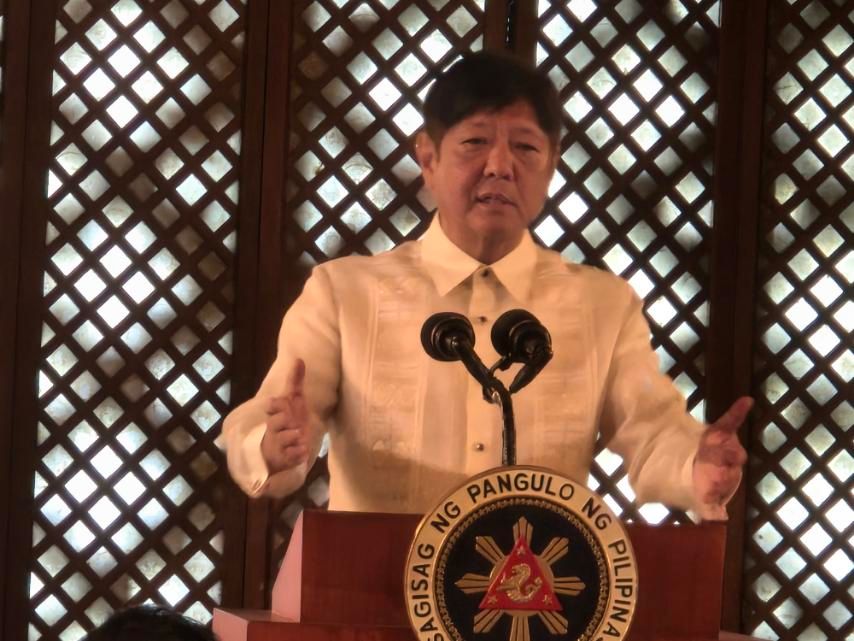Marcos cites LGUs' role in addressing hunger
At A Glance
- According to Marcos, the government is aware of the challenges that the country is facing regarding its anti-hunger campaign. However, he remained optimistic about turning the tables around.
President Marcos has lauded the local government units (LGUs) for their role in the administration's continued efforts to combat hunger and malnutrition in the country, saying they have better knowledge and insights on resolving the issue.

Marcos said this as he led the awarding of the Walang Gutom Awards (GWA) in Malacañan on Wednesday, June 26, which recognized LGUs with outstanding anti-hunger initiatives and practices on food security.
In his speech, the President said that while the national government has been implementing measures to achieve the goal of Zero Hunger by 2027, the administration needs the help of local partners, particularly LGUs, in this endeavor.
"Even as the national government is more than willing to take the lead in helping address this problem of hunger through these programs, we acknowledge that we also need to tap and partner with our local governments, as we always do, when it comes to making a program reach the grassroots level," he said.
"As agents of the government on the ground, our LGUs not only have a better knowledge and have good insights on the incidence of hunger in their localities, but also provide, maybe, perhaps better programs, better strategies, or approaches to address hunger specific to the areas that their constituents lie," he added.
With this, President Marcos reiterated his call for a united and whole-of-nation approach, including international partners, nonprofit organizations, and ordinary citizens, to succeed in eradicating hunger in the country.
"So, our takeaway from this event should be that each and every one of us can contribute to the success of our campaign against hunger," he said.
"If we are truly to succeed in this endeavor, we must put in a whole-of-nation approach to create a lasting solution to this great challenge," he added.
Walang Gutom Awards
The Walang Gutom 2027, or the food stamp program led by the Department of Social Welfare and Development (DSWD), provides monetary assistance for targeted beneficiaries to purchase food commodities from eligible partner merchant stores.
It also provides the government with valuable data to monitor the progress of its beneficiaries in addressing their food problems, ensuring that their families are getting the food and nutrition they require.
The inaugural Walang Gutom Awards recognized 17 out of 101 LGUs for their outstanding anti-hunger initiatives and practices on food security. According to Malacañang, the DSWD's Sustainable Livelihood Program (SLP) has allocated P2 million each to 10 winning LGUs across the Philippines while the remaining seven finalists received P1 million each:
Barangay Level:
- Barangay Commonwealth, Quezon City
- Barangay Naggasican, Santiago City
Municipality Level:
- Asuncion, Davao Del Norte
- Palompon, Leyte
- Bacnotan, La Union
City Level:
- Kidapawan City, Cotabato
- Bago Cuty, Negros
- Cadiz City, Negros Occidental
- Mati City, Davao Oriental
Provincial level:
- Biliran
The winning LGU initiatives and programs were chosen based on a comprehensive set of criteria, including their impact on food security and nutrition, community engagement, innovation, resilience, sustainability, and efficiency in service delivery.
President Marcos congratulated the winning LGUs for being part of the "prestigious list of nominees," while urging the other local governments to possibly adopt the programs of the winning LGUs in their communities.
"Your involvement in the process means a lot to the national government, especially as we aim to put an end to hunger that has been causing suffering to the vulnerable and marginalized in the Philippines for many many decades," he said.
"I invite all our LGUs to look at these outstanding programs of our nominees. See how and why their programs work and examine whether you can adopt or improve these further to apply them in your communities," he added.
Challenges
According to Marcos, the government is aware of the challenges that the country is facing regarding its anti-hunger campaign. However, he remained optimistic about turning the tables around.
"We see the potential to change the situation. We see this in our NGOs and social workers, our partners from the diplomatic corps, and the different agency international agencies," he said.
"Social workers reaching out to help as much as they can, our many communities coming together so that we can feed the hungry and the less fortunate, and in every Filipino working hard to provide food for themselves and for their families," he added.
Citing data from the DSWD, the lead agency of the Walang Gutom campaign, Marcos said nearly 12 percent of Filipino families, or around three million households, still experienced hunger at least once over the last three months of 2022.
One in three Filipino children under five years old is still suffering from stunted growth due to malnutrition.
In addition, the Philippines' ranking in the Global Hunger Index (GHI) is "far from ideal," with the country scoring 14.8, or moderately hungry, which fares below the regional score of East and Southeast Asia of 8.2.